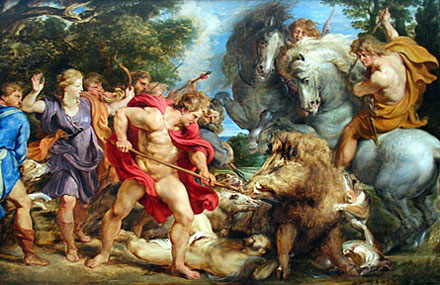IN that day of the chase, there was one enterprise renowned above all others,—the great hunt of Calydon. There, in search of high adventure, went all the heroes of Greece, just as they joined the quest of the Golden Fleece, and, in a later day, went to the rescue of Fair Helen in the Trojan War.

For Oeneus, king of Calydon, had neglected the temples of Diana, and she had sent a monstrous boar to lay waste all the fields and farms in the country. The people had never seen so terrible a beast, and they soon wished that they had never offended the goddess who keeps the woods clear of such monsters. No mortal device availed against it, and, after a hundred disasters, Prince Meleager, the son of Oeneus, summoned the heroes to join him in this perilous hunt.
The prince had a strange story. Soon after his birth, Althea, the queen, had seen in a vision the three Fates spinning the thread of life and crooning over their work. For Clotho spins the thread, Lachesis draws it out, and Atropos waits to cut it off with her glittering shears. So the queen beheld them, and heard them foretell that her baby should live no longer than a brand that was then burning on the hearth. Horror inspired the mother. Quick as a thought she seized the brand, put out the flame, and laid it by in some safe and secret place where no harm could touch it. So the child gathered strength and grew up to manhood.
He was a mighty hunter, and the other heroes came gladly to bear him company. Many of the Argonauts were there,—Jason, Theseus, Nestor, even Atalanta, that valorous maiden who had joined the rowers of the Argo, a beloved charge of Diana. Boyish in her boldness for wild sports, she was fleet of foot and very lovely to behold, altogether a bride for a princely hunter. So Meleager thought, the moment that he saw her face.
Together they all set out for the lair of the boar, the heroes and the men of Calydon,—Meleager and his two uncles, Phlexippus and Toxeus, brothers of Queen Althea.
All was ready. Nets were stretched from tree to tree, and the dogs were let loose. The heroes lay in wait. Suddenly the monster, startled by the shouts of the company, rose hideous and unwieldy from his hiding-place and rushed on them. What were hounds to such as he, or nets spread for a snare? Jason's spear missed and fell. Nestor only saved his life by climbing the nearest tree. Several of the heroes were gored by the tusks of the boar before they could make their escape. In the midst of this horrible tumult, Atalanta sped an arrow at the creature and wounded him. Meleager saw it with joy, and called on the others to follow. One by one they tried without success, but he, after one false thrust, drove his spear into the side of the monster and laid him dead.
The heroes crowded to do him honour, but he turned to Atalanta, who had first wounded the boar, and awarded her the shaggy hide that was her fair-won trophy. This was too much for the warriors, who had been outdone by a girl. Phlexippus and Toxeus were so enraged that they snatched the prize from the maiden, churlishly, and denied her victory. Maddened at this, Meleager forgot everything but the insult offered to Atalanta, and he fell on the two men and stabbed them. Only when they lay dead before him did he remember that they were his own kinsmen.
In the mean time news had flown to the city that the pest was slain, and Queen Althea was on her way to the temple to give thanks for their deliverance. At the very gates she came on a multitude of men surrounding a litter, and drawing near she saw the bodies of her two brothers. Swift on this horror came a greater shock,—the name of the murderer, her own son Meleager. All pity left the mother's heart when she heard it; she thought only of revenge. In a lightning-flash she remembered that brand which she had plucked from the fire when her son was but a newborn babe,—the brand that was to last with his life.
She ordered a pyre to be built and lighted, and straightway she went to that hiding-place where she had kept the precious thing all these years, and brought it back and stood before the flames. At the last moment her soul was torn between love for her son and grief for her murdered brothers. She stretched forth the brand, and plucked it again from the tongues of fire. She cried out in despair that the honour of her house should require such expiation. But, covering her eyes, she flung the brand into the flames.
At the same time, far away with his companions, and unwitting of these things, Meleager was struck through with a sudden pang. Wondering and help- less, the heroes gathered about, to behold him dying of some unknown agony, while he strove to conquer his pain. Even as the brand burned in the fire before the wretched queen, Meleager was consumed by a mysterious death, blessing with his last breath friends and kindred, his dear Atalanta, and the mother who had brought him to this doom, though he knew it not. At last the brand fell into ashes, and in the forest the hero lay dead.
The king and queen fell into such grief when all was known, that Diana took pity on them and changed them into birds.